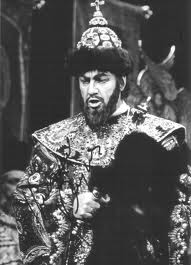 |
| Nicolai Ghiaurov as Boris Godunov |
- The 1872 revision added an entire act set in Poland.
- The villains Marina and Rangoni were added.
- The scene before St. Basil's Church was rewritten and moved to the Kromy Forest.
These changes created a broader canvas with more human interest and a greater historical sweep. However, because the opera was the first major Russian opera to portray a tsar on the stage, it was (personally) deleted from the repertory by Tsar Alexander III.
The finest recording of the 1872 "revised" Boris was made by the Berlin Philharmonic with Claudio Abbado conducting. Abbado is an expert Mussorgsky conductor. He makes good musical decisions throughout, and the little moments in the opera (the scene with the policeman, the drunken monks) just feel right. He has a fine cast, headed by Anatoly Kotscherga in the title role and American bass Samuel Ramey as Pimen, the monk who witnessed Boris' crime: the murder of the Tsarevitch in order to gain the throne for himself.
Russian tenor Sergei Larin (who would go on to make many recordings with Valery Gergiev and the Mariinsky Orchestra) gives a fine, authentic performance as Grigory, the young monk who decides to take on the identity of the murdered heir to the throne. Finally, Marjana Lipovsek is a smooth, wicked Marina, wrapping the Pretender around her finger in the Polish act. The orchestral playing and choral singing are first-rate, with crisp textures. The set is even more attractive now that it has been re-issued at a bargain price as part of the Sony Opera House series.
Mussorgsky died in 1885. His friend Nikolai Rimsky-Korsakov, having already worked on revisions of the unfinished opera Khovanschina
Although it is not performed much anymore, the Rimsky revision was used to make several classic recordings of the opera. Foremost among these is an excellent 1970 set made by Herbert von Karajan and the Vienna Philharmonic. Karajan understands this music, and excels at bringing out the rich palette of colors that Rimsky-Korsakov added to the score. Having the expert Viennese players, with their unique approach to music and tone color only adds to the aural experience.
This set features an international cast, with Bulgarian bass Nicolai Ghiaurov an impressive presence and fine dramatic actor in the title role. Martti Talvela (who recorded a Boris of his own for EMI




